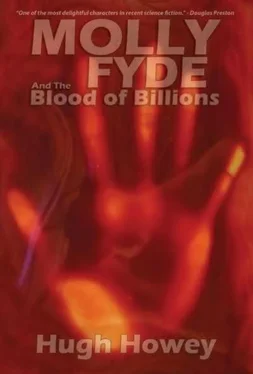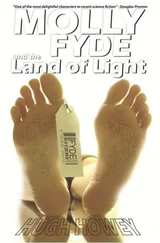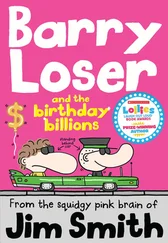“Oh, you’ve got the shape right,” Byrne agreed. “You’ve had that nailed for hundreds of years. However, your cosmologists don’t seem to appreciate the consequences, even though it’s completely obvious.”
“Consequences?” Cole asked.
“Everything in the universe is indeed traveling in a straight line. Which means—” He frowned, pursing his thin lips as if formulating a dumbed-down version for a child. “Imagine we’re sitting on the North Pole of your planet.”
Cole looked up at the snow flurries, at the large spire behind him. His imagination hardly needed to exert itself. “Done,” he said.
“Now picture the matter of the universe spreading out from here, all of it heading in every direction possible around your planet. Where is it going?”
“Back to where it started, just like when I go walking in a straight line.”
“Except you were traveling alone ,” Byrne pointed out. Cole could almost imagine the armless man wagging his finger like Professor Phister used to. “Don’t forget,” Byrne said, “that there’s a lot of stuff in this example. If it’s all moving roughly the same speed—”
“The South Pole!” As soon as Cole uttered the answer, a lot more fell into place; he could almost hear his brain click audibly. The leading theory of their day, hundreds of years old and mostly unchanged, remained the Big Bang theory. Even with the problems of inflationary theory and dark energy, it was still the best they had, as messy and patchwork as it had become.
Cole thought about all that matter spreading out across the surface of a sphere, all heading away from the North Pole. He could see it traveling through the dips and rises, thinning out as it moved away. And then he could see it starting to come back together . All of it—all of everything —meeting in a big crunch at the South Pole. He considered the expanding universe and pictured for the very first time where it was expanding to!
“That’s why the expansion is speeding up,” Cole murmured. It was one of the mysteries of cosmology, the odd fact that expansion was accelerating when gravity should be slowing it down. Now he knew why. He turned to Byrne. “We’re halfway there, aren’t we? The matter is no longer flying away from itself, it’s now coming closer together! Gravity is working the other way, speeding it along.”
Byrne nodded. “Precisely how we like to put it. We are ‘past the universal equator.’ Well past, in fact.”
Cole forgot where he was, all the trouble he’d seen, all the matters relatively inconsequential. His brain went giddy with the possibilities, scrambling to assemble them into a coherent whole.
“That also explains hyperinflation,” he said. “It explains why things are going so quick in the beginning. All that matter just finished its downward swoop, so it would be absolutely flying as it came together!” He paused, finding a problem with the theory. “But why don’t we see it coming if we’re getting closer?” he asked. “Where’s all the other stuff?”
“All that stuff is over the horizon, to extend the metaphor.”
Cole pictured that. “But not because the light fails to bend, right? Is it because of the speed everything’s traveling?” Cole held up his finger, seeing it clearly. “It’s because of the direction it’s traveling through this fourth dimension.”
Byrne smiled broadly at Cole. “You are the one, aren’t you? I can see it, now. I never could in Mollie.”
Hearing her name elicited a shiver from Cole, snapping the descent into philosophy and cosmology. He remembered where he was, felt it like an icicle stabbing through his chest. He pictured Molly strapped to the gurney in Byrne’s ship, and the vision angered him, breaking the physics lesson. It helped him see another flaw in Byrne’s theory.
“That can’t be right,” he said. “The Big Bang didn’t happen in a place , it happened everywhere. It created space. Hell, the Big Bang happened just as much in my Portugal as it did in the Andromeda galaxy!”
Byrne laughed at this, bending at the waist and uncrossing his legs. It was a jolly laugh, very Human-like. When he settled down, he turned to Cole: “Son, we aren’t talking about hypotheticals, here. I’m not discussing theory . This is what we know, what we’ve known for a very long time. We’ve observed it.”
“That’s impossible,” Cole spat. “How can you observe something that destroys everything?”
“Oh, but it doesn’t. Very nearly but not quite. Not everything arrives at the same time, and some of it gets deflected. Besides, the South Pole of the universe, if you like to consider it that, is a very big place. As hot as it gets—and it gets hot enough to melt down nature’s laws—there are ways to get information through. Just as a particle can escape a black hole now and then, we can make sure data survives the Great Passing.”
Cole’s jaw dropped. “You’ve done this? This isn’t the first time we’ve been here?”
“Literally? You and I?” Byrne looked at the world zipping around them. “Of course it is.” He laughed. “There’s nothing mystical here, none of that repeating-our-actions nonsense. No, no, in fact, each universe is vastly different. That’s our job . That’s why I say this is our universe.”
Cole shook his head. “I don’t understand.”
“What is life but information, my young friend? We are just—well you are just chemical programs and mindless routines. Ahh, you frown, and you are right to do so. Sentient things cannot grasp the accidental nature of their existence, and they are correct to feel this way. Tell me, do you know why Humans and the Bern look so similar?”
Cole looked at his hands and considered the question. “Convergent evolution?” he guessed. “The simplest solutions predominate?” But he knew that wasn’t right. Hadn’t Dani given him clues in the hallway of that Drenard prison?
“Nonsense. The odds are prohibitive. Look at the diversity of life on any one planet. An honest account of them is more bizarre than the differences between you and a filthy Bel Tra. No, my little Chosen One, the reason the Bern look alike all across the universe, the way they are able to rule all of creation with an iron and beneficent embrace, is simple: we set everything up in advance.”
Cole continued to stare at his palms; he peered at the lines in them. “You made us?”
“Almost,” Byrne said. “There are problems now and then. We just get the—to use a Terran expression—the ball rolling. And most times, the ball is kind enough to go downhill, following the route we set up in advance. It’s all about rules , you see. If the laws of nature are within certain parameters, you get a universe conducive to life. And when you can rig impervious seeds full of genetic information, seeds that can only be blown apart by the forces present at the end of the universe, seeds that ablate just right during the creation process, then you achieve what all life seeks.”
“Which is?” Cole asked.
“Immortality, of course.”
Byrne smiled. “And not the temporary sort. We’re not talking organ transplants, or colonies on a different egg but still in the same solar basket. We’re talking about real descendants surviving the end of time and making it through to the next beginning.”
“But it’s all your life, right? Only what you decide lives and ever gets that chance.”
“Most of it. But then, we’re setting up our universes to be warm and wet, which is a habitat conducive to other sorts of breeding, mutating brands of scum. The problem for these life forms is that we’ve given ourselves a head start. And the… unique method we use to communicate with the next generation is tied to our DNA, so we know what’s going on first. Of course, there have been mutations in the past that outpaced our local representatives, but since intergalactic spaceflight is—or has been thought to be—impossible, these were just pockets of annoyance scrubbed away every twenty billion years or so, motes that contaminated a mere galaxy or two, but what are a few galaxies in the grand scheme of things? Practically nothing.”
Читать дальше












